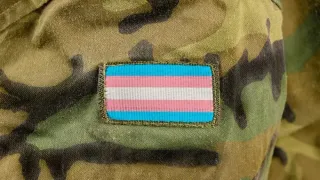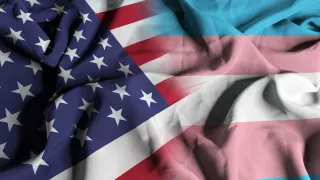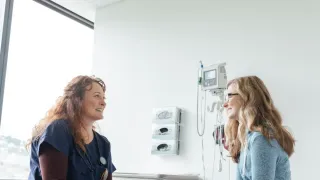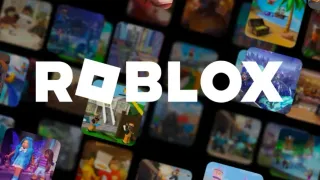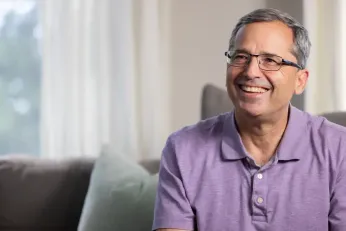
5 hours ago
EDGE Interview - Josh Kraft: Building Community, Championing Equality, and Shaping a New Boston
Steve Duffy READ TIME: 7 MIN.
Josh Kraft has spent 35 years working in the communities of Boston. Most recently, Josh was President of the New England Patriots Foundation, and for three decades worked with the Boys & Girls Clubs of Boston, including 12 years as its President and CEO.
Josh’s commitment to service began with his first job out of college as an outreach coordinator at a South Boston nonprofit. There, he was responsible for making sure at-risk youth attended school in the morning, regularly visiting their families at home. It was in this role that Josh saw firsthand truancy, addiction, and domestic violence, but also what is possible for communities when like-minded individuals engaged in a common goal.
In 1993, he founded the Boys & Girls Club in Chelsea at a time when the city and its schools were in state receivership. Located in the basement of a public housing development, Josh went door-to-door raising money from local businesses to rehabilitate the facility and organize and fund a summer basketball league coached and refereed by local police officers he had personally recruited. Josh would serve as executive director of the Chelsea Boys & Girls Club for the next 15 years, building and managing an extremely loyal staff and deeply engaged local Board, leading major local fundraising campaigns and piloting innovative programming to create a safe haven for thousands of young people in one of Massachusetts’ most underserved communities.
Unanimously selected to serve as the Boys & Girls Club of Boston’s President and CEO in 2008, Josh fostered a community of more than 200 program partners throughout Boston and Chelsea, doubling the club’s budget to $26 million and leading a five-year campaign that raised nearly $132 million. During his tenure, Josh doubled the organization’s membership, deepened its impact, and expanded its reach to Boston’s Jamaica Plain, Roslindale, and Mattapan neighborhoods.
As President of the New England Patriots Foundation, today Josh oversees tens of millions of dollars in support of education, health, social justice, diversity, and youth development.
Josh continues to serve his community on the boards of the Urban League of Eastern Massachusetts (Board Chair), Boys & Girls Clubs of America, and Brigham and Women’s Hospital. With his commitment to community and service rooted in his Jewish faith, Josh is also active in combatting antisemitism and co-chairs the Hate Crimes Task Force for Massachusetts.
He received his bachelor’s degree from Williams College and his master’s in education from the Harvard Graduate School of Education. He is the father of two adult daughters, both of whom work for non-profits.
EDGE: What inspired you to run for mayor of Boston, and what sets you apart from the other candidates?
Josh Kraft: You may or may not know this, but I've worked in the communities for 35 years, 30 of those years with the Boys & Girls Club of Boston. The other five years, I continued community work, mostly doing some substance use disorder work and re-entry work. In those 35 years, I've met thousands of people that I've listened to and learned from, and they've taught me so much about their hopes, their challenges, their resilience, but most importantly, they've taught me about the power of community and how the power of community can come together and make change. They are what inspired me to run for mayor. The city is headed in the wrong direction. I think we have an administration that's focused on political ideology, but not getting results for residents and small businesses -- that's what I believe in. I'll focus my administration on accountability, accessibility, transparency, and competent fiscal and operational management.
EDGE: You officially moved to Boston in October 2023. How would you respond to those who question your claim to understanding the city’s dynamics, especially longtime residents and voters?
JK: I understand why they would say that, but I've spent 35 years working in and around the neighborhoods of Boston every day, and meeting people. I’ve learned from the people of Boston, and I’ve heard their stories. Getting out and understanding the voters and their needs is really the most important thing, and I have been doing that for years. I've heard a lot of the same issues in every neighborhood I've been in, regardless of socioeconomic status, race, ethnicity, and religion. It's always the same concerns. People don't feel listened to or connected to the city. People don't feel like they're getting results from this administration, and that's what I'm committed to. I will have to make sure that I make that clear.
EDGE: What is your view on the role ICE currently plays in Boston communities?
JK: I'll refer back to my 35 years. Many of the people I learned from were immigrants to this city and this country. Many of them are hardworking, committed to working, educating their kids, doing right by their communities, and are integral parts of the community. I think the mass deportation plans from DC are completely wrong. I think it's abhorrent that Bostonians could be sitting in their place of work, their school, their house of worship, or just walking down the street, and be taken away, especially when they have zero connection to violent crime. I'll stand with our immigrant community by protecting those who are doing right.
EDGE: How would you address the rising cost of housing and the displacement of long-time residents in Boston neighborhoods?
JK: So, where I've gone around, as I mentioned, every neighborhood, a lot of folks don't feel listened to or connected to the city, but the number one tangible issue is the cost of living, driven by the cost of housing, especially for working people. We need to support both our residents with restricted incomes and our working residents. Many of them have said they want to live in the city, work in the city, and raise kids, but they can't afford to live here. We have a program, and we know that there are about 26,000 units of permanent housing that can't get off the ground because it costs too much and it's too difficult. On our first day in office, we'll fast-track those projects by collaborating with developers to create paths for housing construction as soon as possible. We're in a housing emergency, which comes with about 125 million in tax revenue. We're going to take that tax revenue and create a first-time home buyer program that also includes folks in working families, because many working people make too much money to get into a first-time home buyer program. Additionally, we will establish an opt-in rent control program, where landlords who agree to maintain their rents at a minimal increase over 10 years will receive an annual tax rebate. This will help create more affordable rents. They'll benefit from it with a tax break. I don’t believe in rent control, and it will never get passed, but this is a creative way to create affordable rents. When we developed this policy, we had housing advocates at the table as well as landlords and developers. They didn’t all necessarily agree on everything, but we were able to still create something that works for all.
EDGE: We’re living in increasingly divisive times—how would you work to bring Bostonians together across political, racial, and economic lines?
JK: That's what I've done my whole career, bringing people together and building community. I believe that's one of the most important responsibilities of a mayor. I'll continue to do that by listening, understanding, and bringing folks together who don't necessarily agree with each other. I will hear both sides and work on ways to reach an agreement that considers all their concerns, while also ensuring a wide-ranging solution. I don't care if you disagree with me, I'm always going to listen to people and bring people under my tent. It's just what I've done my whole life.
EDGE: Your platform highlights plans to “restore momentum and support for the Boston Human Rights Commission,” noting limited updates under the current administration. How would you restore this?
JK: I will hold myself and my administration accountable. I'll hold the commission accountable for getting work done. I am not sure who's on the commission now, but I'll get people who are passionate, who care, and who want to make a difference. I want my administration to stand up for anybody being discriminated against, especially members of our LGBTQ+ community. Every day, I will ensure that the HRC reflects this passion and is dedicated to protecting and supporting all members of the queer community.
EDGE: Considering some of your campaign funding comes from donors who also support conservative causes, how do you plan to maintain trust with Boston’s progressive LGBTQ+ community?
JK: I'll say my track record. In 2017, I was honored by PFLAG with the Cornerstone of Equality award. That was the first win for the Boys & Girls Club in America. More than 5,400 students have started Queer-Straight Alliances in our clubs. Again, I will mention the training that I implemented, the first one in Chelsea, for our staff to take to help train them in working with the queer youth, because I was alarmed by the high suicide rate. I wanted us to support those queer kids. I promise you I will continue to be the leader that all Bostonians need, because my mother always told us, remember sometimes your worst day is most people's best day and its your responsibility is to protect targeted and marginalized groups and make sure they're not only safe, but they have access to opportunity so that they can thrive in community. I've always taken her words to heart my whole life, and that of course includes the LGBTQ+ community.
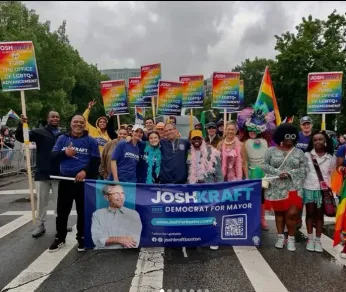
Source: Josh Kraft / Provided
EDGE: You pledged to “defend LGBTQ+ Bostonians from unwarranted attacks from the federal government.” What local legal or advocacy mechanisms would you activate in the face of federal rollbacks, especially on transgender protections?
JK: I do understand what's going on with the federal government and the cuts across the board for many of our vulnerable populations or targeted populations. I'd say marginalized. I think first of all, with regard to federal cuts, I'm going to rely on our federal delegation, where there's a lot of veteran leadership from Congressman Lynch right here in Boston to Congressman Neal, who was chair of Ways and Means out in Springfield. All the other folks I know that they know where you can kick over rocks, they know where you can find funding, and that might be scarce in the next three and a half years. I'm going to work with them. I'm going to call them and rely on them. I am proud to say that in 2017, I was honored by PFLAG for starting a Queer-Straight Alliance in some of our Boys & Girls clubs. I'm not certain, but I believe we were the first to do so in the country. In addition to that, back in 2004, while I was running a club in Chelsea, I had the staff trained in how to work with LGBTQ+ youth. At the time, there was a high suicide rate among queer teens, and we wanted to do something to help. This kind of advocacy is important to me. I will continue to use partnerships and work together with our business and public health community to find ways to protect these kids, but also to provide services for the LGBTQ+ community that can support them and support their allies.
EDGE: What is your message to those voters who are going to vote for you because of your last name?
JK: I've never been asked this question. It’s a great one. I would say, “Don’t, go by my record.” I have worked in the community my whole life. I have learned from the community, and I have learned about the power of the community to make change. I'm going to listen to people as much as possible. It doesn't mean I'll promise everything to everyone, but I'll listen and use the feedback from our listening tours to inform our policy, ensuring it positively impacts all Boston residents. Again, that doesn't mean everyone gets what they want, but we'll listen to everyone and do our best to help the city's residents succeed.
EDGE: Name something that Mayor Michelle Wu got right?
JK: She did expand the Free Museum Pass Program. It's creating access for families to enjoy and engage in art around the city. Some of the participating museums are the Isabella Stewart Gardner Museum, the John F. Kennedy Presidential Library and Museum, and the Museum of African American History.
For more information about Josh Kraft and to read his LGBTQ+ plan, visit www.joshforboston.com

